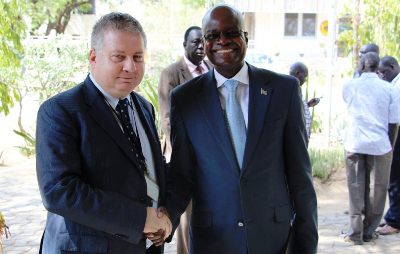S. Sudan: EU to support 30,000 primary teachers with incentives
April 11, 2017 (JUBA) – 30,000 primary school teachers in war-torn South Sudan, who are currently being paid as little as $3 a month, will receive a monthly incentive of $40 under the European Union IMPACT programme.

The EU ambassador to South Sudan, Stefano De Leo, said the organisation will help primary schools across South Sudan stay open and keep the social fabric together, despite conflict, humanitarian and economic crisis, displacement and famine.
“Under the EU’s IMPACT programme, 30,000 primary school teachers in South Sudan will receive monthly incentives worth $40 over a period of 18 months, providing vital support to the education sector,” the EU said in a statement posted on its website.
It adds, “This monthly payment is intended to top up – through private implementing agencies, teachers’ salaries as a bridging effort due to the collapse of salaries as a consequence of the dire economic crisis”.
Meanwhile, by funding incentives for primary school teachers in Africa’s youngest nation, IMPACT will provide critical support to the education system, enabling teachers to continue to teach and the primary schools to continue to function.
“It will increase teachers’ attendance, improve standards of teaching and support thousands of children in South Sudan to go to school – a critical factor in sustaining the social fabric, bringing communities together and ultimately helping to build peace and stability in a country in which school-age children make up more than one third of the population,” further notes the EU’s statement.
The programme, it said, would be managed by BMB Mott MacDonald, which also leads the consortium implementing UK aid’s Girls’ Education South Sudan programme (GESS), with Charlie Goldsmith Associates, one of their GESS consortium partners.
Over the last three years, GESS has reached over 3,500 schools with more than 9,000 school grants, paid over 300,000 cash transfers to more than 180,000 girls and reached 2 million listeners through BBC Media Action radio programmes.
IMPACT will build on the systems established as part of GESS, including the South Sudan School Attendance Monitoring System, a fully dis-aggregated online system that tracks remote attendance reporting and monitors flow of funds through to schools.
The programme will reportedly be supported by strong accountability mechanisms to ensure only teachers who are working and regularly attending school will be paid.
“This will be assured through real-time teacher attendance reporting via SMS, making sure teachers are really in school and teaching, to www.sssams.org, and complemented by the national roll-out of the EU-funded Human Resources Information System (HRIS) for Education,” the EU said.
The HRIS, which was already successfully piloted in two of South Sudan’s former 10 states, will reportedly provide comprehensive and reliable data on the entire education sector workforce, supporting the payment of teachers’ incentives, providing evidence of the worth of investment and forming a platform for teacher development.
(ST)
